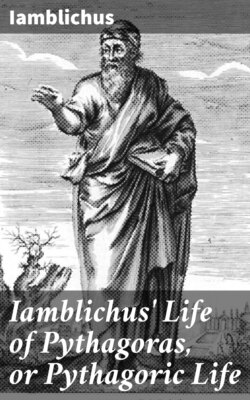Читать книгу Iamblichus' Life of Pythagoras, or Pythagoric Life - Iamblichus - Страница 7
На сайте Литреса книга снята с продажи.
CHAP. III.
ОглавлениеTable of Contents
Pythagoras, therefore, having been benefited by Thales in other respects, and especially having learned from him to be sparing of his time; for the sake of this he entirely abstained from wine and animal food, and still prior to these from voracity, and confined himself to such nutriment as was slender and easy of digestion. In consequence of this, his sleep was short, his soul vigilant and pure, and his body confirmed in a state of perfect and invariable health. In possession of such advantages, therefore, he sailed to Sidon, being persuaded that this was his natural country, and also properly conceiving that he might easily pass from thence into Egypt. Here he conversed with the prophets who were the descendants of Mochus the physiologist, and with others, and also with the Phœnician hierophants. He was likewise initiated in all the mysteries of Byblus and Tyre, and in the sacred operations which are performed in many parts of Syria; not engaging in a thing of this kind for the sake of superstition, as some one may be led to suppose, but much rather from a love and desire of contemplation, and from an anxiety that nothing might escape his observation which deserved to be learnt in the arcana or mysteries of the Gods. Having been previously instructed therefore in the mysteries of the Phœnicians, which were derived like a colony and a progeny from the sacred rites in Egypt, and hoping from this circumstance that he should be a partaker of more beautiful, divine, and genuine monuments of erudition in Egypt; joyfully calling to mind also the admonitions of his preceptor Thales, he immediately embarked for Egypt, through the means of some Egyptian sailors, who very opportunely at that time landed on the Phœnician coast under mount Carmelus, in whose temple Pythagoras, separated from all society, for the most part dwelt. But the sailors gladly received him, foreseeing that they should acquire great gain by exposing him to sale. But when, during the voyage, they perceived with what continence and venerable gravity he conducted himself, in conformity to the mode of living he had adopted, they were more benevolently disposed towards him. Observing, likewise, that there was something greater than what pertains to human nature in the modesty of the youth, they called to mind how unexpectedly he had appeared to them on their landing, when from the summit of mount Carmelus, which they knew was more sacred than other mountains, and inaccessible to the vulgar, he leisurely descended without looking back, or suffering any delay from precipices or opposing stones; and that when he came to the boat, he said nothing more than, “Are you bound for Egypt?” And farther, that on their answering in the affirmative, he ascended the ship and sate silent the whole time of the voyage, in that part of the vessel where he was not likely to incommode the occupations of the sailors. But Pythagoras remained in one and the same unmoved state for two nights and three days, neither partaking of food, nor drink, nor sleep, unless perhaps as he sate in that firm and tranquil condition, he might sleep for a short time unobserved by all the sailors. To which we may add, that when the sailors considered how, contrary to their expectations, their voyage had been continued and uninterrupted, as if some deity had been present; putting all these things together, they concluded that a divine dæmon had in reality passed over with them from Syria into Egypt. Hence, speaking both to Pythagoras and to each other with greater decorum and gentleness than before, they completed, through a most tranquil sea, the remainder of their voyage, and at length happily landed on the Egyptian coast. Here the sailors reverently assisted him in descending from the ship; and after they had placed him on the purest sand, they raised a certain temporary altar before him, and heaping on it from their present abundance the fruits of trees, and presenting him as it were with the first fruits of their freight, they departed from thence, and hastened to their destined port. But Pythagoras, whose body through such long fasting was become weaker, did not oppose the sailors in assisting him to descend from the ship, and immediately on their departure eat as much of the fruits as was requisite to restore his decayed strength. From thence also he arrived safe at the neighbouring lands, constantly preserving the same tranquillity and modesty of behaviour.
